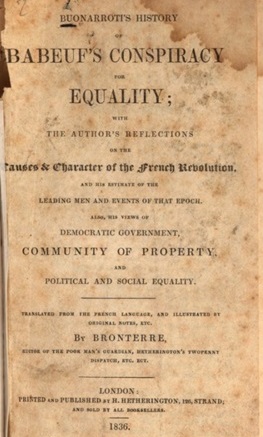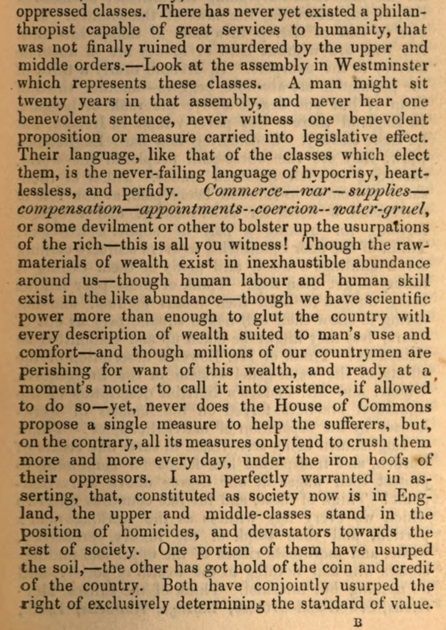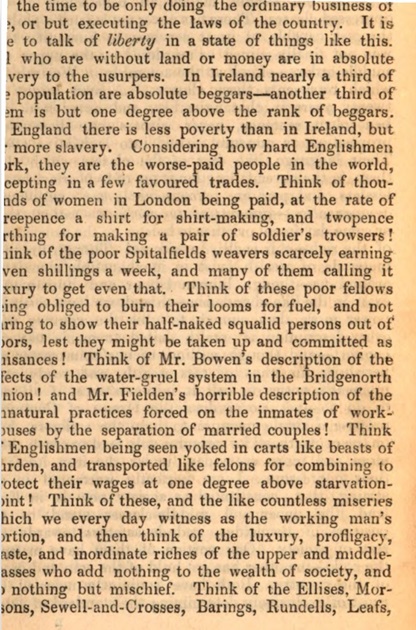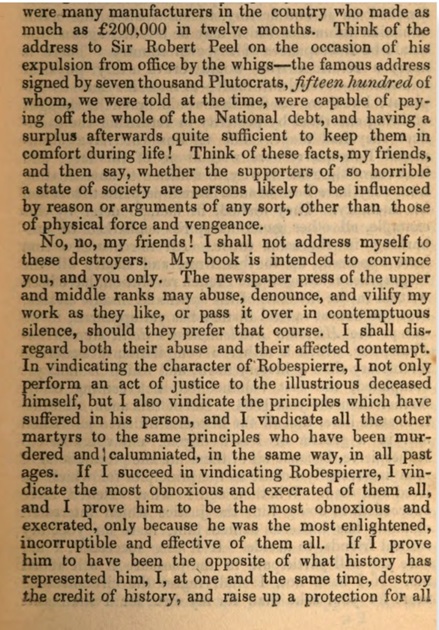Life
| 1805-1864 [nom de plume, “Bronterre”]; b. Granard, Co. Longford; son of tobacco merchant (mother nee Kearney); his father died in the West Indies struggling to recover business losses; ed. locally and selected for Edgeworthstown model school; BA TCD, grad. 1829; commenced law at King’s Inns, Dublin but changed to to Gray’s Inn, London 1830; joined Chartist movement and wrote political articles under pen-name “Bronterre”; associated with Wm. Cobbett and others involved in the war against newspaper ‘stamp’ (or tax); espoused Repeal of the Union and Owenite socialism; ed. Poor Man’s Guardian (prop. Henry Hetherington); trans. Philippe Bounarotti’s Conspiration pour l’Egalité dite de [Gracchus] Babeuf [1828] (1836), invoking "community of property" as the leading principal and advocating in practice nationalisation of land, direct taxation and disestablishment of the church; published first vol. of a life of Robespierre but suffered the confiscation of his papers; answered O’Connell’s attack on trade-unions in short-lived Bronterre’s National Reformer; |
| came into conflict with trade-union moderate William Lovett [LWMA], and left London to join Feargus O’Connor in the Chartist movement of N. England, there editing O’Connor’s Northern Star, to which he largely contributed; engaged in Chartist convention, London 1838; opposed Convention’s decision to call general strike facing Government’s refusal of the Charter - a cautious move endorsed by the Convention, Aug. 1839; accused of sedition and advocating physical force after the Newport uprising and shared imprisonment with O’Connor in Lancaster Castle, April 1840-Sept 1841; quarrelled with O’Connor on their release; suffered deepening poverty with his family and made a precarious moved to Isle of Man and opened a stationers, which supported the National Reformer and Manx Review up to 1847; returned to England and elected to Chartist Convention of 1848, resigning when the planned demonstration on Kennington Common was abandoned in face of Government threats; |
| returned to politics to form National Reform League for Peaceful Regeneration of Society addressing public education, decent poor law and other foundational issues of social democracy; lectured at at John St. Institute and establ. living the Eclectic Institute in Soho; rescued from dire poverty in 1859 by a Testimonial Fund raised by followers including Patrick Hennessy and Charles and James Francis Murray, living in Pentonville, London, where died on 23 Dec. 1864; survived by his wife and four children; his papers collected and published by Martin Boon and friends as The Rise, Progress and Phases of Human Slavery (1885). ODNB PI DIB RIA |
[ This notice owes much to the article on O’Brien by Fergus A. D’Arcy in the Dictionary of Irish Biography (RIA 2009) - online; accessed 28.06.2024. ]
[ top ]
Works| Books |  |
|
|
||
| Pamphlets | ||
|
||
| Poetry (satire) | ||
|
||
| Journalism | ||
|
||
|
||
Bibliographical details
The Life and Character of Maximilian Robespierre: Proving by facts and arguments, that that much-calumniated person was one of the greatest men, and one of the purest and most enlightened reformers, that ever existed in the world: also containing Robespierre’s principal discourses, addresses, reports, and projects of law, &c., in the National assembly, National convention, Commune of Paris, and the popular societies; with the author’s reflections on the principal events and leading men of the French revolution, etc., etc., etc. / By James Bronterre O’Brien. Vol. 1 [no Vol. 2]. (London: J. Watson [1837]), viii, [3]-522 pages 19 cm [available at HathiTrust - online [poor copy]; ded. ְ‘To the Radical and Social Reformers of great Britain and Ireland’, with Pref. beginning: ‘My Friends and Fellow-labourers [...]’
[ top ]
Criticism
Asa Briggs, ‘Fergus O’Connor and J Bronterre O’Brien’, in Leaders and Workers ed. J. W. Boyle [Thomas Davis Lectures] (Cork 1966).
| Some pages from The Life and Character of Maximilian Robespierre (1837) | |
 |
 |
| [...] | |
 |
|
| —HathiTrust - online; 28.06.2024 [with some imperfect page-images] | |
[ top ]
D. J. O’Donoghue, Poets of Ireland (odges Figgis 1912) - cites Ode to Lord Palmerston, London, 1856, 16mo; An Ode to Louis Napoleon Bonaparte, London, 1857, folio sheet; An Elegy on the Death of Robbspierre, with life, etc., London, 1857, 16mo; A Dissertation and Elegy on the Life and Death of the Immortal Maximilian Robespierre, etc., London, 1859, 12mo; A Vision of Hell, or a Peep into the Realms Below, alias Lord Overgrown’s Dream, etc., a poem (chap-book), London, 1859, 8vo. - and remarks: ‘Author of one or two other political works, and a celebrated Chartist. Was, in fact, the “brains” of that movement. He was a native of Granard, Co. Longford, was born in 1805, was educated at Edgeworths-town School, graduated B.A. T.C.D., 1829, entered Gray’s Inn as a student, and died in poverty December 23, 1864.’
Desmond Fennell, ‘Irish Socialist Thought’, in The Irish Mind, ed. Richard Kearney (1985), b. Granard, Co. Longford; ed. TCD, worked under William Thompson in co-operative movement; chief intellectual of Chartism, nicknamed ‘the schoolmaster’ by Feargus O’Connor; admired figures of French socialism, Babeuf, Blanqui, and Saint-Simon; writings in periodicals; first to use term social democrat in English; fnd. National Reform League, early 1850s, formulating evolution socialist programme. (Fennell, p.194.)
Notes
Portrait, Bronterre O’Brien (seated) and Fergus O’Connor in 1939), Irish Labour History Museum, engraving; printed in History Ireland (summer 1994), p.27.
[ top ]